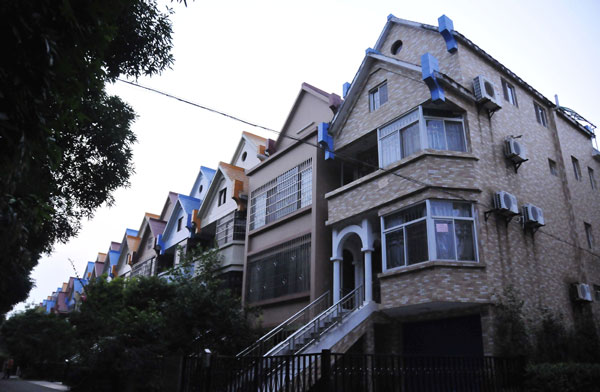'Uncle House' under investigation
Updated: 2012-10-23 07:00
By Zheng Caixiong in Guangzhou (China Daily)
|
||||||||
An official in Guangzhou, capital of Guangdong province, has been removed from duty after investigators found he owned far more houses than he could afford on his salary, according to a disciplinary watchdog's announcement on Monday.
Cai Bin, 56, who is commonly known as fangshu, or "Uncle House" among locals and netizens, was restricted from traveling and asked to cooperate with further investigations, Mei Heqing, a senior official with the city's Party commission for discipline inspection, said at a news conference.
 |
|
A house in Guangzhou, Guangdong province, owned by the wife of Cai Bin, former head of the urban management bureau in the city's Panyu district. Liang Zhiwei / Xinhua |
Cai is suspected of receiving huge bribes when he served as deputy chief of Panyu district's public security bureau and head of the district's urban management bureau, according to Mei.
Investigations showed that Cai and his family owned 22 houses, one more than the number claimed by whistleblowers who recently brought the scandal to light online.
Cai's properties are in Panyu and Nansha districts and include factory buildings, villas, commercial apartments, business complexes and parking lots.
Among the houses with a combined floor space of more than 7,200 square meters are a 240-sq-m multistory house and a 3,405-sq-m factory building.
A local real estate agency estimated that the total market value of the properties Cai and his family members own could reach more than 40 million yuan ($6.3 million).
As a county-level official, Cai's monthly pay is around 10,000 yuan, while his wife, Shi Liying, earned less than Cai. Shi was director of the general office and secretary-general of the Panyu district association of industry and commerce before she retired. Cai's son, Cai Zhanpei, who has Australian citizenship, lives in Guangzhou and runs an advertisement company.
"Relevant departments have officially put on file to further investigate the case and promised to make the findings public when the investigation is completed in the following months," Mei said.
To fight corruption, the Guangzhou city Party commission for discipline inspection plans to introduce a pilot project asking all Party and government officials to report their properties and the employment status of their spouses and children in the following months, Mei said.
The pilot project will be first introduced in the city's Nansha district in the near future and cover the entire metropolis when it is proved to be effective in the following years.
To prevent and fight corruption, the commission is also considering working jointly with relevant departments, including the housing department and the exit-and-entry department, to allow the public to make inquiries into city officials' properties and exit-and-entry records, Mei added.
Chen Tianxiang, a professor with the School of Government of Sun Yat-sen University in Guangzhou, said the government should conduct a thorough investigation of the case and do more to fight corruption.
"Cai's case indicates the operation of some government departments lacks transparency and supervision from outside," Chen told China Daily.
"And governments should introduce concrete and effective measures to prevent the centralization of power by senior officials to help keep corruption in check," he said.
Chen urged government departments to learn and study the successful experience in fighting corruption from Hong Kong and Singapore.
zhengcaixiong@chinadaily.com.cn

 Relief reaches isolated village
Relief reaches isolated village
 Rainfall poses new threats to quake-hit region
Rainfall poses new threats to quake-hit region
 Funerals begin for Boston bombing victims
Funerals begin for Boston bombing victims
 Quake takeaway from China's Air Force
Quake takeaway from China's Air Force
 Obama celebrates young inventors at science fair
Obama celebrates young inventors at science fair
 Earth Day marked around the world
Earth Day marked around the world
 Volunteer team helping students find sense of normalcy
Volunteer team helping students find sense of normalcy
 Ethnic groups quick to join rescue efforts
Ethnic groups quick to join rescue efforts
Most Viewed
Editor's Picks

|

|

|

|

|

|
Today's Top News
Health new priority for quake zone
Xi meets US top military officer
Japan's boats driven out of Diaoyu
China mulls online shopping legislation
Bird flu death toll rises to 22
Putin appoints new ambassador to China
Japanese ships blocked from Diaoyu Islands
Inspired by Guan, more Chinese pick up golf
US Weekly

|

|






